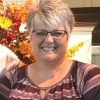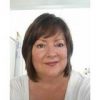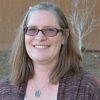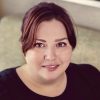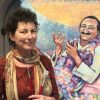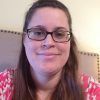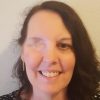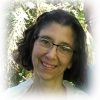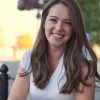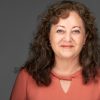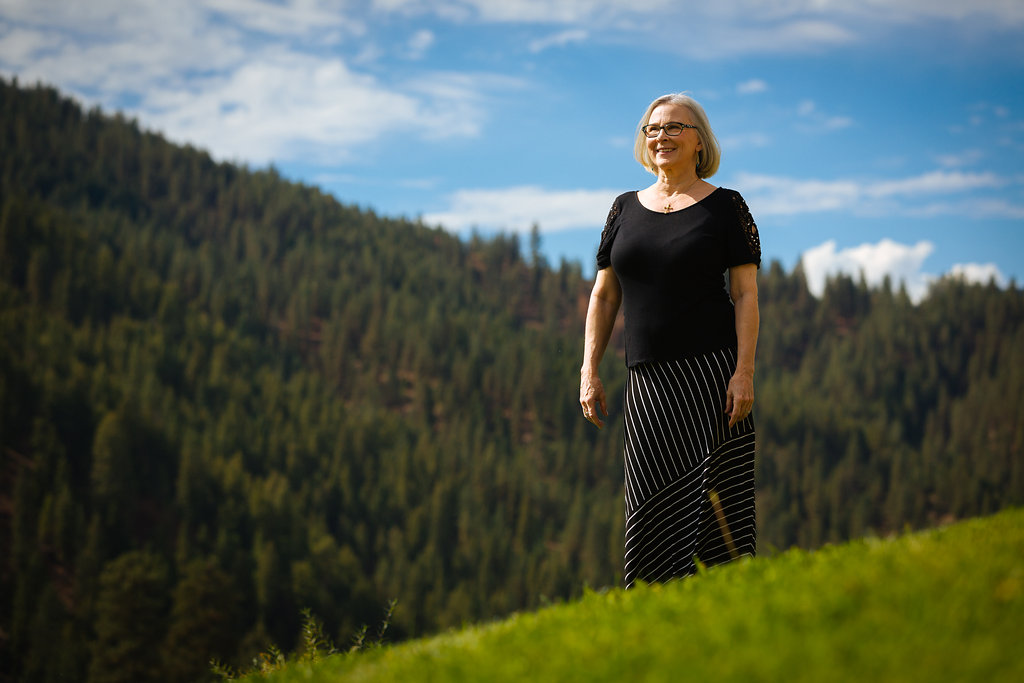
Conversations: Michele, thanks so much for talking to CONVERSATIONS today. I know you’ve been battling CML for some time. Tell us what CML is . . .
Michele Tschirhart: CML, also known as chronic myelogenous leukemia, is a rare type of blood cancer.
It is currently not curable, but is treatable with medications that became available in 2001.
Conversations: There are 40 to 50 different leukemias and lymphomas. Do you find it challenging talking to friends and family who can’t differentiate CML, from CLL from AML, etc. With many have different prognosis and treatment plans? And that many people don’t know that leukemia is a cancer . . . ?
Michele Tschirhart: It can be challenging explaining that you have a blood cancer, and that you will have it for the rest of your life. Many people do not understand exactly what “chronic” actually means. I have many people that that I do not see on a regular basis that are shocked to find ought that I “still” have cancer. Because I am still out and about, living my life, they assume that I am cured. It is very eye opening to many when they come to the realization that someone can live a long time, despite the cancer.
Conversations: Yes. And encouraging . . .
Michele Tschirhart: I, myself did not know that there were so many different types of leukemia when I was first diagnosed, so it was a learning process for me as well.
Conversations: Yes. And within CML. There seems to be a wide range of levels of severity from people who are doing rather well and “living their life” to people who are VERY sick and under constant duress. What is the reasons for that variance? Separates those people in how they are doing with it? In some cancers, let’s say small cell lung cancer. The prognosis is sadly the same for everyone.
Michele Tschirhart: I am certain that there is a scientific reason why some respond to treatment, while others do not, but often a person’s success with treatment is directly related to their actual treatment and their compliance with their treatment. It is my belief that each and every person that is diagnose with CML should see a CML specialist, one that treats many CML patients, not just a hematological oncologist that may only see one case of CML their entire career. Often people do not live close to an oncologist that actually specializes in CML, so that makes it a bit more difficult. If you do not live near a specialist, make the trip to see one, at least once. Most likely this oncologist will be onboard with collaborating with a local oncologist.
Another reason that some do not do well and other do, is that their treatment plan is not followed, meaning that they skip doses of their medications. This can be very dangerous for a person with CML.
Conversations: Certainly, very true. The difference in quality of care is expansive. With people in rural areas, in particular, not having access to specialists being the most severely affected.
Knowledge is certainly key. And you’re very active in the CML community. Knowing scores, hundreds of people with CML. Michele, how did you become so active? Is this something that just evolved? Or did you say to yourself, “I’m going to get out there and help as many people as I can?”
Michele Tschirhart: Very, very true, however, this is your life that we are talking about and I have lost far too many friends with CML because of this, it is very, very sad, and a bit scary, too.
Conversations: And do you use these losses of friends to inspire you? And your involvement?
Michele Tschirhart: Truthfully, it just evolved. When I was diagnosed with leukemia, in February of 2011, I was very, very sick; so sick that I just did not have the energy to keep my friends and family updated on my condition, my disease and my progress, so I started a blog; Dancing and Travelling My Way Through Leukemia. It was there that my friends and family could go to see how I was doing and to educate themselves about my disease, as I learned about it, too. Somehow, other people with CML began to find my blog. They told me how much it helped them, and I just continued. During this process of learning, writing and educating myself, I became close to many others with CML.
Conversations: That’s powerfully inspiring, Michele. Is your blog still active? Do you have a link to it?
Michele Tschirhart: And yes, the loses that I have endured has inspired me to continue to reach out to others, to teach them to be their own self advocates so that I can help save anyone that I am able. I must laugh, you used the words that Knowledge is Key; that is the title to one of my blog posts!
I do, and it is! https://www.leukemiasurvivor.co
Very much so, I was very much a quiet, shy person before being diagnosed with leukemia, now my whole entire life is out there for the world to see. It is funny how developing cancer can change a person!
Conversations: Michele, I want to return to CML specialists. To your knowledge, who, which hospitals throughout the country are considered the most experienced with CML? If I am new to CML, where can I go to find a list of specialists?
Indeed, it often can make people appreciate how precious life is. And how every day is a gift.
Michele Tschirhart: If you are newly diagnosed with CML, you will likely be in a whirlwind of emotions, not thinking clearly and will most likely take the advice of whomever diagnosed you. As you become more educated and aware, and can start thinking clearly again, you can begin to look for a CML specialist. The CML Society offer a great list of specialists here: https://www.nationalcmlsociety.org/cml-specialists
Conversations: Thank you. The “Society” is the only non profit that specializes in CML?
Michele Tschirhart: You must always be your own self advocate and you need to find an oncologist that fits your specific needs and personality. I personally doctor shopped until I found the perfect fit. This is a lifelong cancer, so you had better find someone that you can trust, relate to and who you like!
Honestly, Doug, I do not know.
Conversations: Makes sense. Do you want to share with CONVERSATIONS your specialist?
Michele Tschirhart: Of, course!! My oncologist is Dr. Ronald Paquette, at Cedar Sinai in Los Angeles, Ca. For those of you that do not know, I live in Boise, Idaho. I also see Dr. Brian Druker at OHSU, in Portland. Both of these men are CML specialists and amazing human beings and I owe my life to them.
As you can see, I travel to my appointments! Which is costly and time consuming, however, I want to live a very long life, so I feel as though I am “worth it”!
Conversations: Thanks for sharing that, Michele. And to your point above, you have to travel to see your specialist. What advice do you give someone who can’t afford to travel? What options do they have? Any suggestions for them?
Michele Tschirhart: Well, priorities? I certainly do not have a money tree in my backyard, so I would encourage anyone to save up enough money to make that trip, at least once. Like I said previously, many of the CML specialists are happy to see you once and then work with a local oncologist and oversee your care. IF you get into trouble you will have a specialist onboard. Pinch your pennies, set up a Go Fund Me, shop early for airfare, check air bnb’s, or even other CML patients close to a specialist. We all can make just about anything we want happen. Right? Like that new cell phone? I don’t know, maybe that sounds harsh, but we are talking about our life here.
Conversations: It’s a good advice. But I think money aside, I think one of the battles here is sometimes people don’t realize or understand how sick they are. Maybe their local onc didn’t make it clear, maybe they heard what they wanted to hear . . . They didn’t fully understand the stakes. Sadly, the most educated and edified patients get the best treatment. We hear this day after day, call after call. It’s very startling. And no, it’s NOT necessarily all about money and access. But indeed, it falls back to “knowledge is king.”
Michele Tschirhart: You are ABSOLUTELY correct!!! Unfortunately, this happens more often than not, and it makes me absolutely CRAZY! Often, people diagnosed with CML do not take it seriously, as they may have been diagnosed during a rout8ine exam and blood work, and have yet to feel the effects of the cancer. They quickly move into a stable, acceptable amount of disease in their blood and they stop taking their medications, most often due to side effects, and then their disease quickly progresses to a more serious phase.
Conversations. Tragic. A research client asked me this week about some research where they wanted the patients to video themselves taking the meds every today and I said, “what?!” And they said, exactly above. People are not med compliant and that’s a focus of this research.
Michele Tschirhart: I have a short story about a person, here in Boise. They were diagnosed with CML and reached out to me through a CML group and my blog. When I asked who they were seeing, they told me a local oncologist, and I asked what their treatment plan was. This treatment plan was not a “typical” treatment plan for a newly diagnosed CML patient. The medication was at a very low dose, and because the patient was have difficulty adjusting to the medication the dose was lowered further. I strongly encouraged this individual to seek a CML specialist, they did not, and to make a long story short, they went into blast crisis and had to undergo a bone marrow transplant. I very aggressive, dangerous option.
Conversations: That’s a very powerful story. And one which shows how important it is for people to take control of their own care. Many people become too reliant on their doctors. What I say to people is – in many rare diseases, the patients know more than the doctors do. Specialists aside.
Michele Tschirhart: Unfortunately, this is a very common problem; either people do not like the way the drugs make them feel, or they think that they are “better”, with CML that is a very dangerous choice.
Conversations: There are 300 different types of cancer and an oncologist cannot be expert in all of them.
Michele Tschirhart: That is very true, you live with yourself and your disease, every single day; they do not. I am a firm believer in self advocacy. Doctors, no matter how trained, educated and practiced they are, they are still only human. The call “practicing medicine” for a reason.
Conversations: Michele, treatment is obviously crucial and the focus of this battle but I want to conclude by asking you about faith and spirituality and how that informs you living with CML, your daily life, your perspective.
Michele Tschirhart: Well, I thank God every single day that I am still alive. I believe that my faith has gotten me through some of my darkest days. I even made a pact with God, that as long as He sees fit to leave me in this world, I will do my part to help others with this disease, as well as any other disease. I believe that Knowledge is Key, no matter what ails us. I try my best to live my life as proudly as I can and I pray that I am here for a very long time to continue to do so.
Conversations: Very gracefully said. Thanks, Michele.
Michele Tschirhart: My pleasure!



